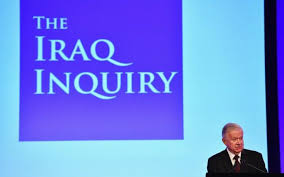6 July 2016 – On 15 June 2009, Gordon Brown announced an inquiry into the Iraq war. It was to investigate, as Sir John Chilcot, the inquiry’s chairman, put it:
the UK’s involvement in Iraq, including the way decisions were made and actions taken, to establish, as accurately as possible, what happened and to identify the lessons that can be learned.
Chilcot was asked to investigate nine years of sensitive foreign policy; he has taken nearly seven years to do it.
NOTE: The Bloody Sunday inquiry took 12 years to investigate the events of one day.
I am not going to discuss what is obviously a devastating indictment of Britain’s decision to invade Iraq. Rather, I want to discuss the process of the inquiry including the “Maxwellization” of the review, a process named after a legal battle involving the disgraced media mogul Robert Maxwell, whereby those criticized in the first draft of a report are given an opportunity to respond. It is interesting that Lord Justice Leveson chose not go through the process in the phone hacking inquiry because it “would have killed any prospect of doing the report in time”. I shall use my notes from a London Review of Books (LRB) Chilcot event earlier this year.
At that LRB event I learned that public inquiries in the UK are part of an ancient institution. Edward I’s Statute de Officio Coronatoris of 1276, which codified already longstanding law, obliged coroners to:
go to the place where any be slain or suddenly dead’ to investigate
But coroners’ inquiries rarely deal with matters of general public concern. The idea of holding an inquiry in response to a public scandal is comparatively recent. Until well into the 20th century, such matters were left to UK parliamentary select committees, which were, inevitably, subject to political influence. In 1912, the Marconi Company won a government contract to build wireless telegraph stations across the British Empire. There were widespread allegations of corruption in the tendering process, and a select committee was appointed to investigate. The (Liberal) majority absolved the (Liberal) government of responsibility; a Conservative minority declared the government guilty of gross impropriety. It was clear that a more independent process was needed. When, in 1921, there were allegations that officials in the Ministry of Munitions had destroyed documents relating to procurement contracts, Parliament legislated for a system of public inquiries. There have since been inquiries into a wide range of matters of public interest, from the Aberfan disaster to the death of David Kelly, Profumo to tabloid phone hacking.
There are two main complaints against Maxwellization:
1. It normally creates intolerable delay. This might be a weak argument in the Chilcot inquiry given the range and complexity of the issues under consideration.
2. It threatens an inquiry’s independence. Independence from political influence was supposed to be the cardinal virtue of public inquiries; sending drafts of reports to politicians hardly looks good. Is this anything more than a problem of perception? Are valid criticisms removed or tempered thanks to political pressure? It’s hard to say. But the theory is to undertake such procedure may lead to a better outcome: hearing all sides of the story helps an inquiry to get the facts right. Anyway, that was Chilcot’s argument:
it ensures that any criticism included in the final report is fair and reasonable – an intrinsic reason. The process is essential not only to the fairness but also the accuracy and completeness of our report – an instrumental reason.
The counterpoint is that if the inquiry does its job properly, it won’t need to send its draft out for comment. Also, under Maxwellization only those who are criticized get to comment. Why just them? Criticism might focus the mind, but in principle anyone could correct a factual flaw.
But a distinct “other problem” arises when an inquiry looks back to attribute blame. The urge to blame is powerful, and for that reason the attribution of blame can distract from the systemic problems that may need to be addressed. The more, for example, the blame for Iraq is placed on Tony Blair, the easier it is to avoid more general questions about parliamentary checks on the executive, the nature of our collective foreign policy, the proper procedure for declaring war and so on. At the LRB event it was noted any inquiry must decide what to aim for. Should it (1) try to parcel out responsibility for a past wrong or (2) design procedures minimizing the risk that similar mistakes will take place in the future? It can’t always do both at the same time. The extent of Maxwellization in the Chilcot Inquiry suggests that the first route has been taken.
That’s understandable. It would be wrong to forget Iraq. But it would also be wrong for Iraq to forestall discussion of all foreign policy questions. As someone at the LRB noted “assigning responsibility may be the only way to steer between amnesia and fixation”. In the end, charged with helping the nation to come to terms with its mistakes in Iraq, Chilcot’s duty was a modern form of the medieval coroner’s. As Edward I’s statute commanded:
Upon these things being inquired, the bodies of such persons being dead or slain shall be buried.
